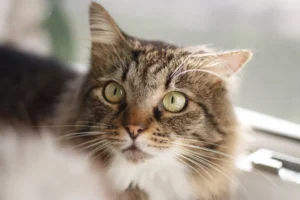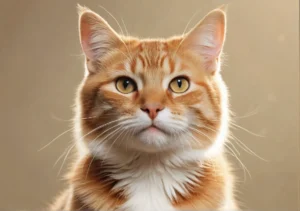Have you noticed that your cat’s meows seem quieter than usual? Understanding why your feline friend has suddenly gone mum can help you ensure their health and happiness.
Checking for Health Issues
Is your feline friend’s meow sounding more like a whisper lately? Well, it could be a sign of an underlying health issue. Dental problems are a common culprit for quiet meows in cats. Imagine how uncomfortable it must be for your kitty to vocalize with a toothache! Make sure to schedule a vet check-up to rule out any dental issues.
Another possible health concern could be an upper respiratory infection. Just like humans, cats can catch a cold too. When your cat’s meows seem quieter than usual, it might be due to congestion or sore throat. Keep an eye out for other symptoms like sneezing or watery eyes, and consult your vet for proper treatment.
Remember, our feline friends can’t tell us when something is wrong, so it’s essential to pay attention to changes in their behavior, including their vocalizations. Regular check-ups and prompt veterinary care are key to keeping your cat happy and healthy.
Behavioral Changes
Have you noticed a change in your cat’s meowing patterns? From stress and anxiety to environmental changes, there could be a variety of reasons behind those quiet meows. Cats are sensitive creatures, and even small disruptions in their routine can affect their vocalizations.
Stress and anxiety are common culprits for altered meowing in cats. If your kitty is feeling anxious due to a recent change in their environment or routine, they may become quieter than usual. Providing a safe and comfortable space, along with plenty of love and attention, can help alleviate their stress.
Additionally, any sudden changes in your cat’s surroundings, such as a new pet or furniture rearrangement, can lead to a shift in their vocal behavior. Cats thrive on routine and familiarity, so try to maintain a stable environment for your furry friend.
Remember, every cat is unique, and understanding their individual needs and behaviors is essential for their well-being. By addressing any potential health issues and providing a supportive environment, you can help your cat feel safe and secure, ensuring those meows return to their usual volume in no time.
Aging
As cats age, it’s natural for their meows to become quieter. This change in vocalization can be attributed to various factors such as cartilage wear in their vocal cords or decreased muscle tone in their larynx. Just like people’s voices may change with age, so can a cat’s meow. If you notice your cat’s meows getting quieter as they get older, it’s important to provide them with extra care and attention to ensure their comfort in their senior years.
Vocalization Preferences
Every cat has its own unique communication style, which includes the volume of their meows. Some cats are naturally quieter than others and prefer to communicate in subtler ways. Factors such as breed, personality, and even past experiences can influence a cat’s vocalization preferences. It’s essential to pay attention to your cat’s individual style of communication and adjust your interactions accordingly. Remember, a quiet meow doesn’t mean your cat isn’t happy or healthy; it’s just their way of expressing themselves.
Tips for Understanding Your Quiet Cat
- Observe Body Language: Pay attention to your cat’s body language and facial expressions to better understand their needs and emotions.
- Provide Quiet Spaces: Create quiet and peaceful environments for your cat to feel safe and secure.
- Regular Check-Ups: Schedule regular vet visits to ensure your cat’s health and well-being.
- Respect Their Space: Give your cat the space they need when they prefer solitude or quiet time.
Remember, every cat is unique, and their quiet meows are just a part of their individuality. Embrace and celebrate your feline friend’s quiet communication style, and continue to foster a strong bond based on understanding and love.
Bonding and Trust
If your cat’s meows seem quiet, it could be a sign that they feel comfortable and secure in your presence. Cats typically reserve their loud vocalizations for moments of distress or when they are trying to get their human’s attention. By strengthening your bond and trust with your feline friend, you can encourage them to communicate more openly.
To improve your relationship with your cat, try spending quality time together through interactive play sessions or grooming rituals. Providing treats and positive reinforcement when your cat vocalizes can also help build trust. Remember, building a strong bond takes time and patience, so be consistent in your efforts to show your cat love and affection.
Additionally, keeping a calm and relaxed demeanor around your cat can help create a safe and comforting environment for them. By showing your cat that you are a reliable and nurturing presence in their life, you can help encourage them to vocalize more confidently and express their needs effectively.
How to strengthen your bond with your cat:
- Engage in regular play sessions
- Use positive reinforcement
- Maintain a calm demeanor
Environmental Factors
The quietness of your cat’s meows may also be influenced by environmental factors in your home. Loud noises, such as construction work or household appliances, can make it difficult for cats to communicate effectively. Similarly, the presence of other pets in the household can create competition for attention, leading to quieter vocalizations from your cat.
To create a peaceful environment for your feline friend, try to minimize loud noises during times when your cat is most active. Providing quiet spaces where your cat can retreat and feel safe can also help reduce stress and encourage more vocal communication. Additionally, ensuring that each of your pets receives individual attention and care can help prevent conflicts and promote a harmonious atmosphere in your home.
By taking steps to address environmental factors that may be affecting your cat’s meows, you can help create a more conducive space for open communication and mutual understanding.
Tips for creating a peaceful environment for your cat:
- Minimize loud noises during active times
- Provide quiet spaces for your cat to retreat
- Ensure each pet receives individual attention
Breed-Specific Traits
Is your cat’s meow on the quieter side? Well, it might just be in their genes! Some cat breeds are known for being less vocal than others. Breeds such as the British Shorthair, Maine Coon, and Scottish Fold are generally quieter compared to Siamese or Oriental breeds. If your furry friend belongs to one of these quieter breeds, it’s perfectly normal for their meows to be softer.
Communicating with Your Vet
When it comes to discussing your cat’s meowing habits with your vet, effective communication is key. Make sure to provide detailed information about your cat’s behavior, including any recent changes in their meowing patterns. Here are some tips for effectively communicating with your vet:
- Keep a Meowing Journal: Take note of when your cat meows, how loud the meows are, and any other relevant details. This information will help your vet better understand the situation.
- Be Specific: Instead of saying “my cat is meowing a lot,” provide specific examples like “my cat meows loudly at night but is quiet during the day.”
- Ask Questions: Don’t be afraid to ask your vet questions about your cat’s meowing habits. They are there to help and provide guidance.
- Consider Any Changes: If your cat’s meows have suddenly become quieter, there could be an underlying medical issue. Be sure to discuss any changes with your vet to rule out any health concerns.
Maintaining open and honest communication with your vet will help ensure the best care for your feline friend.
Fun Fact: Cats’ Communication Styles
Did you know that cats have a sophisticated system of communication? From purrs to meows, they use various vocalizations and body language to convey their messages. When it comes to why your cat’s meows might be quiet, it could be due to individual differences in volume or pitch. Just like people, some cats are naturally more vocal than others.
Cats are known to adjust their meows based on who is around them. They often use softer meows when communicating with humans, as a way to show affection and seek attention. This could explain why your cat’s meows seem quiet compared to when they are interacting with other cats. It’s their way of showing that they trust and feel comfortable with you.
If your cat’s meows have suddenly become quieter, it might be worth monitoring their behavior for any signs of discomfort or illness. Cats sometimes vocalize less when they are feeling unwell, so it’s essential to pay attention to any other changes in their behavior. If you’re concerned about your cat’s health, always consult with a veterinarian for proper evaluation and care.
Remember, each cat is unique in how they communicate, so don’t worry if your feline friend’s meows are on the quieter side. It’s all part of their individual personality and preferences. Enjoy listening to their subtle vocalizations as they interact with you in their own special way.
Interesting Facts about Cat Communication Styles:
- Cats have over 100 different vocal sounds in their communication repertoire.
- A cat’s purring is not just a sign of contentment but can also indicate pain or stress.
- Cats use their body language, such as tail flicks and ear movements, to complement their vocalizations and convey messages effectively.
With these insights into cat communication, you can better understand why your cat’s meows may be quiet and appreciate the unique ways in which they express themselves.
Alex, a passionate animal lover, has experience in training and understanding animal behavior. As a proud pet parent to two dogs and three cats, he founded AnimalReport.net to share insights from animal experts and expand his knowledge of the animal kingdom.




